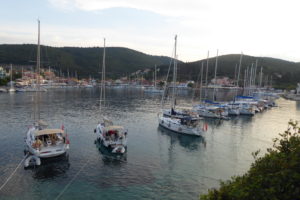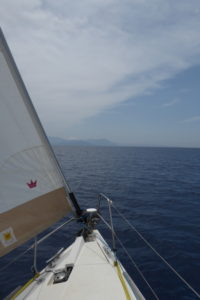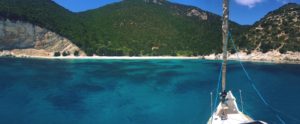22 June 2017
Caravanning In The Ionian
Avoiding the car crash at home.
By Lynda Goetz
 I have just returned from two weeks holiday. Oh yes, it was lovely, thank you. Of course I sent off my postal vote before I left. I do feel that we all have a responsibility to vote, but I won’t get into that just now. Arriving back at Gatwick on Sunday afternoon, even though forewarned (the wonders of the internet), it was still a surprise to find that it was hotter than the Ionian and a less welcome surprise to find that during our absence the air-conditioning in the car had packed up. The journey home was therefore either simply sweltering (windows closed) or noisy and sweltering as we did 70mph (or just a little bit more) down the motorway with the windows open. I had forgotten how noisy that is. My daughter told me I was spoilt, as she pointed out that the only ‘air-conditioning’ her car had anyway was open windows.
I have just returned from two weeks holiday. Oh yes, it was lovely, thank you. Of course I sent off my postal vote before I left. I do feel that we all have a responsibility to vote, but I won’t get into that just now. Arriving back at Gatwick on Sunday afternoon, even though forewarned (the wonders of the internet), it was still a surprise to find that it was hotter than the Ionian and a less welcome surprise to find that during our absence the air-conditioning in the car had packed up. The journey home was therefore either simply sweltering (windows closed) or noisy and sweltering as we did 70mph (or just a little bit more) down the motorway with the windows open. I had forgotten how noisy that is. My daughter told me I was spoilt, as she pointed out that the only ‘air-conditioning’ her car had anyway was open windows.
On a yacht, of course, you close the windows or ‘hatches’ whilst ‘underway’ to avoid any risk of letting in seawater. Yes, you guessed it; our ‘caravan’ was a boat. At the risk of irritating those who are keen on towing their ‘shell’ around with them and then parking it next to another person’s shell in a farmer’s field equipped with loos and showers, I have to say I have never really seen the pleasure in this sort of holiday. I must admit though that with the amount of boats now in the Ionian, or indeed the Mediterranean in general, the parallels are not too difficult to draw: you park up cheek by jowl; you wander off to find the loos and showers; you can ‘mooch’ from place to place or choose to stay put. However, this really is a fun holiday to enjoy with family or friends and can be as active or as lazy as you choose to make it.
The first thing you will need is for one of your party to be able to produce at least the minimum qualification to skipper a boat. In this country these are obtained from the RYA (Royal Yachting Association) and details can be found on their website www.rya.org.uk. If you don’t already have them, getting the appropriate qualification will mean doing a course to enable you to understand the theory and deal with the practical issues. Armed with this you too can join the ‘yachties’; not such an exclusive club these days now that ownership is not a pre-requisite and there are so many holiday companies keen to charter boats.
 Even in the easy waters of the Med, there are the ‘Rules of the Road’ to abide by. Similar to the Highway Code, these are the International Regulations for Preventing Collisions at Sea. There may be no visible roadway, but there do have to be recognised rules for ensuring there are no collisions (well, as few as possible anyway). So, the Rules of the Road set out who has priority and who should change course to avert disaster. However, like many rules and regulations, there are exceptions and also occasions when one rule doesn’t apply, but another does. For example, ‘power gives way to sail’ – except where the vessel under power is very large and unable to manoeuvre quickly, when it becomes your responsibility (if you value your life) to get out of the way. Rather similar really to deciding not to argue with a ten tonne truck or a bus, even where in theory the right of way is yours.
Even in the easy waters of the Med, there are the ‘Rules of the Road’ to abide by. Similar to the Highway Code, these are the International Regulations for Preventing Collisions at Sea. There may be no visible roadway, but there do have to be recognised rules for ensuring there are no collisions (well, as few as possible anyway). So, the Rules of the Road set out who has priority and who should change course to avert disaster. However, like many rules and regulations, there are exceptions and also occasions when one rule doesn’t apply, but another does. For example, ‘power gives way to sail’ – except where the vessel under power is very large and unable to manoeuvre quickly, when it becomes your responsibility (if you value your life) to get out of the way. Rather similar really to deciding not to argue with a ten tonne truck or a bus, even where in theory the right of way is yours.
The winds in the Ionian are supposed to be fairly predictable (unlike the intentions of voters) and it was generally the case that the mornings were very still, with the wind getting up sometime between midday and 2pm. Thus, actual sailing time, as opposed to motoring-around time is somewhat limited. With so many ‘floating caravans’ around, you need to get into port before 4pm unless you want to risk not finding anywhere to ‘park’. Part of the reason for this is the way boats moor up there as opposed to here, where strangely we like to do things differently. Here mooring is often done ‘alongside’ the quay. This means that when boats arrive later they can ‘raft up’ alongside the first boat. On the Continent they tend to moor up ‘stern to’. This means first lining up with your proposed slot, dropping your anchor the requisite distance out and reversing into said slot. You then step ashore from the back of the boat. Easy – in principle.
Should you arrive too late and half a dozen large catamarans have already taken up the last dozen slots (rather annoyingly they take up two slots and there seem to be more and more of them) and their owners for the week are already well into the beer and olives, you are obliged to provide them with their early evening entertainment by mooring up to the rocks (or even anchoring further out in the bay). Having dropped anchor you send a willing or unwilling member of the crew with or without a dinghy (after all, the water is warm), to attach stern lines to the rocks. In some places this is made easier by the fact that the Greeks have provided metal rings. This however does not change the fact that many of the boats do not seem to have the right sort of anchors for the seabed or indeed heavy-enough anchors for the size of the boats. The entertainment for those already comfortably ensconced is watching the new arrivals repeated attempts to lay their anchors and re-tie their stern lines.
Once all that is out of the way, it is time to find the showers and loos provided by the locals. These, it goes without saying, are not provided out of the kindness of their hearts. Whilst I can see the rationale in charging for showers, I am not so sure about charging €1 to use the loo. Will there be those tempted to save on costs by simply filling up the tanks on board and discharging them once out of the bay? Not a great thought. Already, the mounting issue of waste from the mass of boats in the Med is one that must surely be worrying some authorities? As for rubbish and all those plastic water bottles, the quayside bins are overflowing. Recycling does not seem to be a concept the Greeks have yet embraced. Just outside Lefkada, where we picked up the boat, a giant landfill site towers over the channel. On the other side, waste which has escaped before being covered bobs in an ugly fashion against the bank – the foreground to your picture of the feeding pelicans in the saltmarsh beyond.
I would like to say that the little fishing villages which now host the yacht and flotilla brigade are many and varied. In truth, they are all charming and delightful, but very similar. The local fishing boats have moved off the town quay to make way for the flotillas and multiplicity of yachts from all over Europe. They, after all, will bring money into the village by eating at one of the several quayside restaurants or buying from the supermarket. Quayside houses, if not turned into restaurants, have become boutiques selling Madagascan baskets, Indian trousers, Greek olive oil soap, ceramics and olive wood bowls, oh and jewellery. However, unless these are on the quay front they appear to stand little chance of selling anything. The constant refrain seems to be that ‘everybody looks but nobody buys’. Is this austerity or the move away from ‘stuff’ to experiences? People may have splashed out for a yacht or a cat for a week or two, but perhaps they really don’t need or want international souvenirs?
 The Greeks are as welcoming and friendly as I remember from my last trip, which was a very long time ago. They seem happy that tourists are returning to their country after a dip in bookings following the migrant crisis. This did, to be fair, mainly affect those islands closest to Turkey and the large numbers of international tourists this early in the season does suggest that Greece is now benefiting from the security and instability issues in such countries as Egypt and Tunisia as well as Turkey. Hopefully Elena Kountoura, Greece’s tourism minister, was right when she said “Tourism ….. unites people and nations and can be a bridge for cooperation, economic growth, peace and prosperity.” I would suggest that given the car crash of an election that took place whilst we were enjoying our holiday (the front page illustration of Moneyweek Issue 849 says it all, with a bemused- looking Theresa May sitting amongst the wreckage of her vintage car holding on to a detached steering wheel as Jeremy Corbyn wobbles up behind on his bicycle with a smirk on his face), some cooperation, economic growth, peace and prosperity are things we could all do with right now. Whether or not we can look forward to them is another matter. In the meantime I have my memories of caravanning in the Ionian to keep me going through what could be something of a miserable winter – even if I will be allowed to keep my fuel allowance.
The Greeks are as welcoming and friendly as I remember from my last trip, which was a very long time ago. They seem happy that tourists are returning to their country after a dip in bookings following the migrant crisis. This did, to be fair, mainly affect those islands closest to Turkey and the large numbers of international tourists this early in the season does suggest that Greece is now benefiting from the security and instability issues in such countries as Egypt and Tunisia as well as Turkey. Hopefully Elena Kountoura, Greece’s tourism minister, was right when she said “Tourism ….. unites people and nations and can be a bridge for cooperation, economic growth, peace and prosperity.” I would suggest that given the car crash of an election that took place whilst we were enjoying our holiday (the front page illustration of Moneyweek Issue 849 says it all, with a bemused- looking Theresa May sitting amongst the wreckage of her vintage car holding on to a detached steering wheel as Jeremy Corbyn wobbles up behind on his bicycle with a smirk on his face), some cooperation, economic growth, peace and prosperity are things we could all do with right now. Whether or not we can look forward to them is another matter. In the meantime I have my memories of caravanning in the Ionian to keep me going through what could be something of a miserable winter – even if I will be allowed to keep my fuel allowance.
If you enjoyed this article please share it using the buttons above.
Please click here if you would like a weekly email on publication of the ShawSheet

